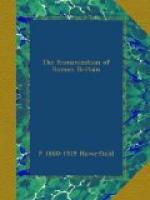Even their geographical position helped, though somewhat indirectly, to further the process. Tacitus two or three times observes that the western provinces of the Empire looked out on no other land to the westward and bordered on no free nations. That is one half of a larger fact which influenced the whole history of the Empire. Round the west lay the sea and the Sahara. In the east were wide lands and powerful states and military dangers and political problems and commercial opportunities. The Empire arose in the west and in Italy, a land that, geographically speaking, looks westward. But it was drawn surely, if slowly, to the east. Throughout the first three centuries of our era, we can trace an eastward drift—of troops, of officials, of government machinery—till finally the capital itself is no longer Rome but Byzantium. All the while, in the undisturbed security of the west, Romanization proceeded steadily.
The advance of this Romanization followed manifold lines. The Roman government gave more or less direct encouragement, particularly in two ways. It increased the Roman or Romanized population of the provinces during the earlier Empire by establishing time-expired soldiers—men who spoke Latin and who were citizens of Rome[1]—in provincial municipalities (coloniae). It allured provincials themselves to adopt Roman civilization by granting the franchise and other privileges to those who conformed. Neither step need be ascribed to any idealism on the part of the rulers. Coloniae served as instruments of repression as well as of culture, at least in the first century of the Empire. When Cicero[2] describes a colonia, founded under the Republic in southern Gaul, as ’a watch-tower of the Roman people and an outpost planted to confront the Gaulish tribes’, he states an aspect of such a town which obtained during the earlier Empire no less than in the Republican age. Civilized men, again, are always more easily ruled than savages.[3] But the result was in any case the same. The provincials became Romanized.
[Footnote 1: English writers sometimes adduce the provincial origins of the soldiers as proofs that they were unromanized. The conclusion is unjustifiable. The legionaries were throughout recruited from places which were adequately Romanized. The auxiliaries, though recruited from less civilized districts, and though to some extent tribally organized in the early Empire, were denationalized after A.D. 70, and non-Roman elements do not begin to recur in the army till later. Tiberius militem Graece testimonium interrogatum nisi Latine respondere vetuit (Suet. Tib. 71).]
[Footnote 2: Cic. pro Font. 13. Compare Tacitus, Ann. xii. 27 and 32, Agr. 14 and 32.]
[Footnote 3: Tacitus emphasizes this point. Agr. 21 ut homines dispersi ac rudes, eoque in bella faciles, quieti et otio per voluptates adsuescerent, hortari privatim adiuvare publice ut templa fora domos exstruerent.... Idque apud imperitos humanitas vocabatur, cum pars servitutis esset.]




